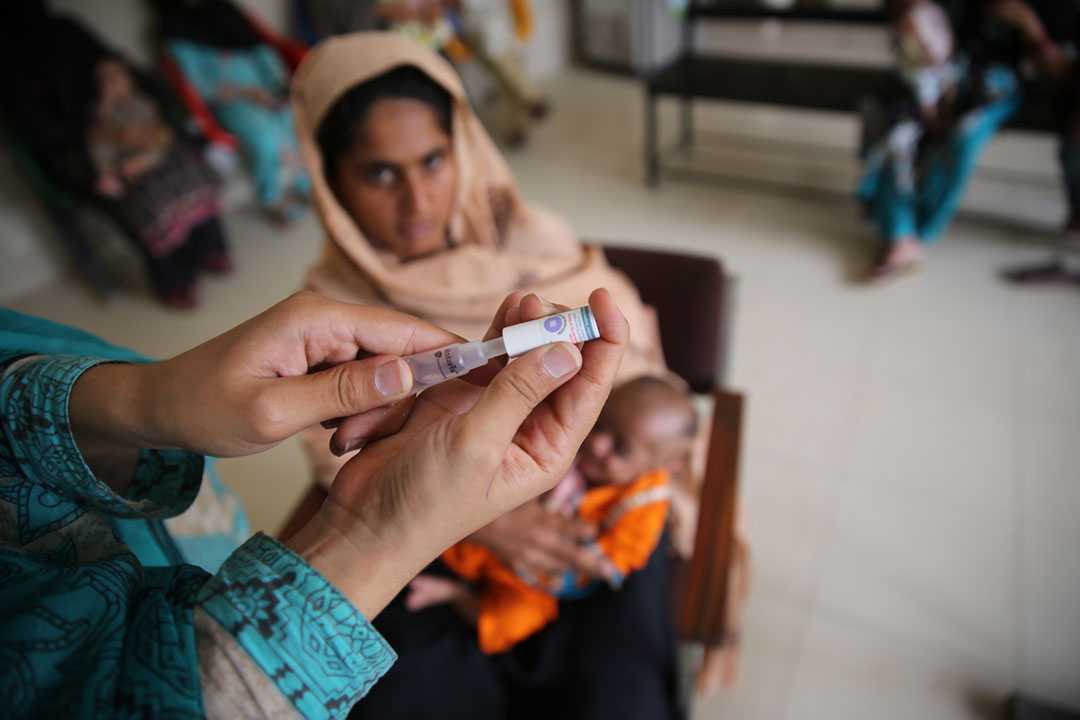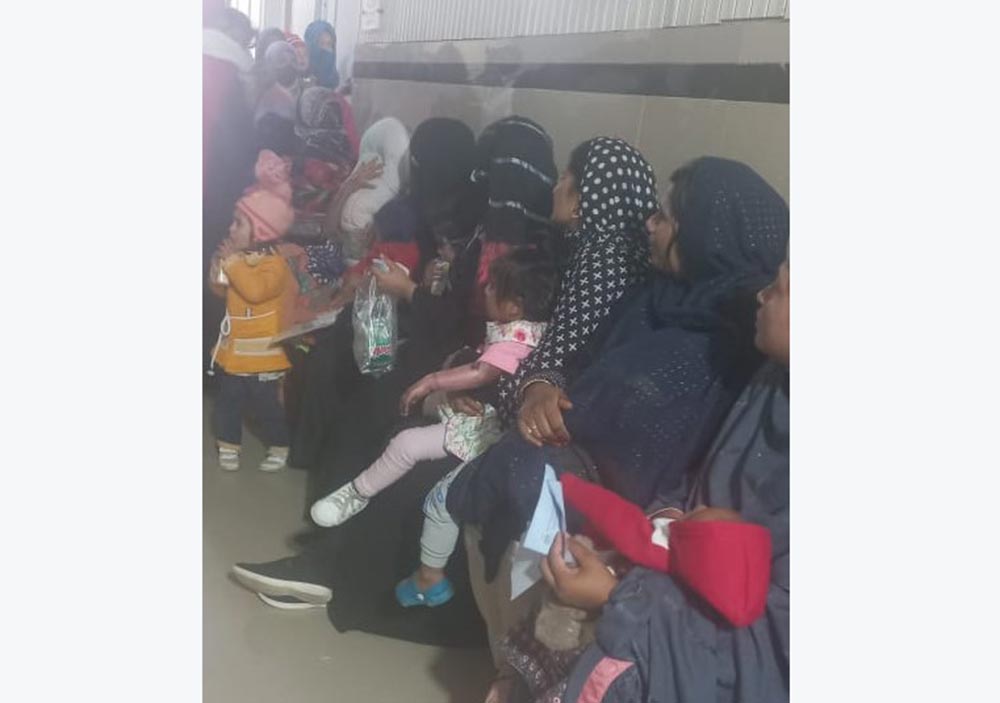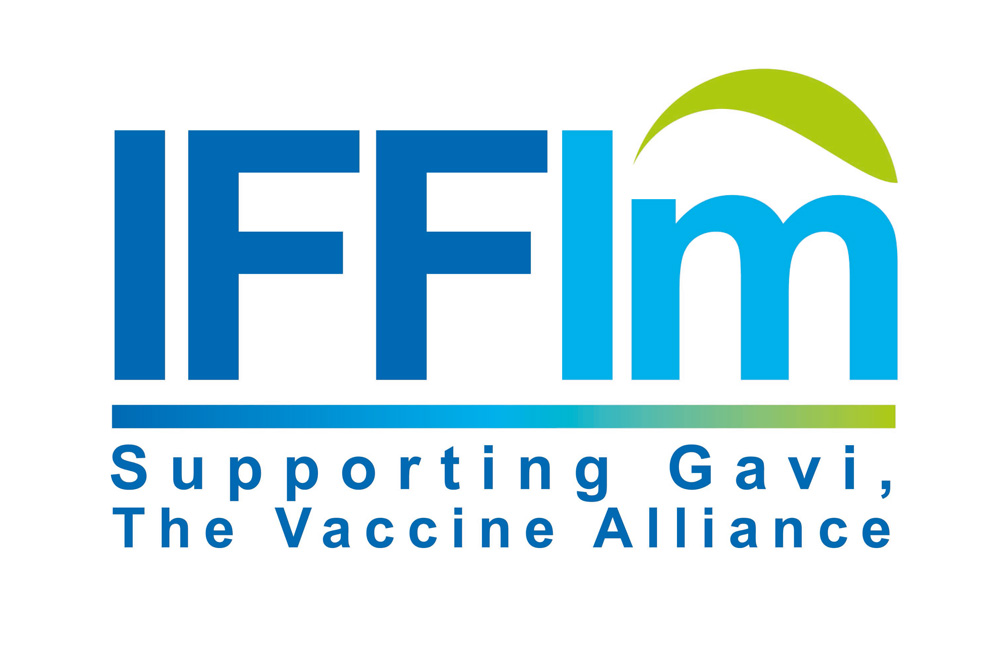Rotavirus vaccination slows down a major childhood killer in Pakistan
- Impact
- Rotavirus vaccination slows down a major childhood killer in Pakistan
Rotavirus vaccination slows down a major childhood killer in Pakistan
25 April 2024

An EPI worker administrating rota vaccine drops to Fatima, 3 months, in rural health centre Manga Mindi, Lahore, Punjab province, Pakistan. Credit: GAVI/2017/Asad Zaidi
Since 2017, Pakistani children have been getting vaccinated against the major cause of deadly diarrhoea. Health leaders and workers say the effects are evident – even if there’s further to go.
Since 2017, Pakistani children have been getting vaccinated against the major cause of deadly diarrhoea. Health leaders and workers say the effects are evident – even if there’s further to go.
Announcements
IFFIm impact
Since its inception IFFIm has disbursed a total of US$ 248 million to Gavi for the rotavirus vaccine.

It's immunisation day at the Tehsil Headquarter Hospital of Gujar Khan, about 60 kilometres southwest of Pakistan's capital, Islamabad, and the government facility is crowded with parents and infants. Among them is Shazia Bibi, who has brought her six-week-old son Shakeel Ahmed to the government facility from their small subsistence farm on the rural belt surrounding the town.
Bibi says her community is poorly educated – she includes herself and her husband in this description – a factor that has historically hindered vaccination uptake. But she says that's changing: "That's why, even today, there is such a rush at the hospital on vaccination day."
"Despite the challenges like sanitation in the country of above 220 million people, above 80% rota vaccine coverage is bringing down the number of infant diarrhoeal cases and deaths in Pakistan."
– Dr Nadeem Jan, former caretaker Federal Minister, current alternate to the Gavi Board
In her view, the rotavirus vaccine – one of the jabs little Shakeel Ahmed is here to receive – has had something to do with that change.
Beating back diarrhoea
Pakistan sees almost 6.4 million cases of paediatric diarrhoea annually. The disease accounts for some 60% of infant deaths, and 8% of deaths in children younger than five years.
Not every one of those deaths is vaccine-preventable – but a meaningful proportion are. Introduced in Punjab in January 2017, and rolled out nationwide over the course of that year, the rotavirus vaccine protects against the pathogen responsible for an estimated 24% of diarrhoea cases in Pakistan, according to the Federal Directorate of Immunization (FDI).
A 2014 study published in the journal PLOS One, established a pre-vaccination baseline. As many as a third of children hospitalised with severe gastroenteritis in Pakistani cities had rotavirus, the researchers found.
Since 2017, vaccination efforts have led to a reduction in the incidence and severity of rotavirus infections among vaccinated children, health workers and policymakers in Pakistan told VaccinesWork.
Former caretaker Federal Minister for Health and current alternate to the Gavi Board Dr Nadeem Jan told VaccinesWork that despite the challenges, including COVID-19 and the 2022 floods in Pakistan, the rising coverage rates of the vaccine over the six years of its availability has significantly contributed to preventing numerous cases of rotavirus-related illness, and has helped alleviate the burden on health care facilities.
"Despite the challenges like sanitation in the country of above 220 million people, above 80% rota vaccine coverage is bringing down the number of infant diarrhoeal cases and deaths in Pakistan," he said.
Researchers at Pakistan's Aga Khan University have been working to quantify the vaccine's impact since its introduction to the routine immunisation schedule. Towards the end of 2023, they reported that the vaccine appeared to be proving 30% effective at bringing down diarrhoea-linked hospitalisations in the country. That's lower than the vaccine's rate of impact in wealthier countries, an expected consequence of differences in sanitation and rates of pathogenic exposure. "Given the vast burden of rotavirus in Pakistan and that the vaccine had shown similar effectiveness in other regional countries, [the vaccine] would still make a significant difference," the researchers explained.
"A significant difference"
Health workers on the ground see similar cause for tempered optimism. Shaheen Ikram, a senior nurse at the Gujar Khan hospital, is one of them. Fewer cases of severe diarrhoeal disease are admitted to the facility these days, he says. But the burden is still heavy.

As many as 30 to 50 diarrhoea patients visit the hospital daily, most of them the children of Afghan refugees, Ikram says. Notably, when nurses probe their parents for their vaccination histories, they often turn out to be unimmunised, he adds.
While the root causes of diarrhoeal disease are environmental – unclean water and contaminated food, the nurse explains – the rotavirus vaccine is provided by the government at the primary health care level to help protect children against those harder-to-remedy environmental dangers.
"We try to vaccinate each child in the area, both at the hospital, and at home, in which vaccinators and Lady Health Workers play an important role," Ikram says.
Rotavirus risk clear to parents in Pakistan
Bibi learned about the rotavirus vaccine from a Lady Health Worker (LHW), who also cautioned that rotavirus-linked diarrhoea could be life-threatening for infants.
Bibi had no trouble believing her warnings. In Shazia's community, lack of clean water means that diarrhoea regularly threatens both children and adults. Some babies she knows have died of it, she says. That's likely a common perspective across the country, and helps to explain why Shazia thinks the rotavirus vaccine has helped to convince families that the trip to the health centre on immunisation day is worth the trouble.
Efforts to strengthen the Expanded Programme on Immunization infrastructure, increase awareness about the importance of vaccination and improve access to vaccines in both rural and urban areas have likely also contributed to rising uptake rates, according to health officials. Those have included initiatives to improve vaccine distribution systems, ensure vaccine availability at health care facilities, and reduce barriers to access such as cost and geographic distance.
Longer lens, bigger plans
According to Dr Jan, a major challenge on the road to reducing the public health risks of diarrhoea will be improving sanitation, an important complement to vaccination.
Another systemic challenge is the disparity in access to immunisation and health care between urban and rural populations, Dr Jan said.
But even a potentially bumpy road ahead doesn't discount the kilometres already covered.
 | This article is republished from VaccinesWork under a Creative Commons license. Read the original article. VaccinesWork is an award-winning digital platform hosted by Gavi, the Vaccine Alliance covering news, features and explainers from every corner of global health and immunisation. |
Share this article
Restricted Access Library
 The material in this Restricted Access Library is intended to be accessed only by persons with residence within the territory of a Member State of the European Union and is not intended to be viewed by any other persons. The material in this Restricted Access Library is provided by IFFIm for information purposes only and the materials contained herein were accurate only as of their respective dates. Certain information in the materials contained herein is not intended to be, and is not, current. IFFIm accepts no obligation to update any material contained herein.
The material in this Restricted Access Library is intended to be accessed only by persons with residence within the territory of a Member State of the European Union and is not intended to be viewed by any other persons. The material in this Restricted Access Library is provided by IFFIm for information purposes only and the materials contained herein were accurate only as of their respective dates. Certain information in the materials contained herein is not intended to be, and is not, current. IFFIm accepts no obligation to update any material contained herein.
Persons with residence outside the territory of a Member State of the European Union who have access to or consult any materials posted in this Restricted Access Library should refrain from any action in respect of the securities referred to in such materials and are otherwise required to comply with all applicable laws and regulations in their country of residence.
By clicking Access restricted content: DYNAMIC-LINK-TEXT I confirm that I have read and understood the foregoing and agree that I will be bound by the restrictions and conditions set forth on this page.
The materials in this Restricted Access Library are for distribution only to persons who are not a "retail client" within the meaning of section 761G of the Corporations Act 2001 of Australia and are also sophisticated investors, professional investors or other investors in respect of whom disclosure is not required under Part 6D.2 of the Corporations Act 2001 of Australia and, in all cases, in such circumstances as may be permitted by applicable law in any jurisdiction in which an investor may be located.
The materials in this Restricted Access Library and any documents linked from it are not for access or distribution in any jurisdiction where such access or distribution would be illegal. All of the securities referred to in this Restricted Access Library and in the linked documents have been sold and delivered. The information contained herein and therein does not constitute an offer for sale in the United States or in any other country. The securities described herein and therein have not been, and will not be, registered under the U.S. Securities Act of 1933, as amended (the "Securities Act"), and may not be offered or sold in the United States except pursuant to an exemption from, or in a transaction not subject to, the registration requirements of the Securities Act and in compliance with any applicable state securities laws.
Each person accessing the Restricted Access Library confirms that they are a person who is entitled to do so under all applicable laws, regulations and directives in all applicable jurisdictions. Neither IFFIm nor any of their directors, employees, agents or advisers accepts any liability whatsoever for any loss (including, without limitation, any liability arising from any fault or negligence on the part of IFFIm or its respective directors, employees, agents or advisers) arising from access to Restricted Access Library by any person not entitled to do so.
"Relief" for mothers in Bayelsa state as malaria vaccine makes waves
07 November 2025
